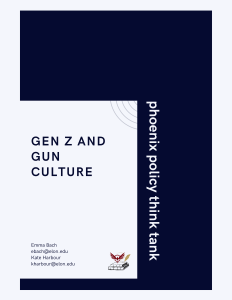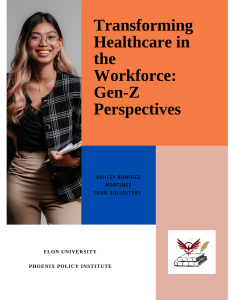Generation Z
Spring 2024: Generation Z
Education
Artificial Intelligence Within K-12 Education: Implications For A Post AI Society
By: Avery Sloan and Savannah Willette
Abstract: As the landscape of Artificial Intelligence (AI) continues to expand at a rapid pace, it becomesimperative to not only understand how this technology works, but what role it plays within our existing systems and institutions. AI, with its capacity to write code, generate images and create content, has the ability to transform the state of K-12 education as we know it. While this technology can be a valuable tool for students and teachers alike, there are nevertheless some serious ethical and learning implications that must be addressed to maximize the utility of AI. At the federal level, guidance regarding the use of AI is lagging. While President Biden issued an executive order in October of 2023 that aimed to foster equity and innovation as the use of AI progresses (Biden, 2023), this memo left American’s with unanswered questions regarding the role of key stakeholders such as educators, researchers and academics. At the state level, guidance has become a game of Hot Potato, directing AI regulation into the hands of district administrators. The inability of federal and state governments to act collectively has resulted in an educational environment that is disorganized and unethical.
Gun Culture
Gen Z and Gun Culture
By: Emma Bach and Kate Harbour
Abstract: Gun violence in the United States presents a multifaceted societal challenge, with nearly40,000 deaths annually, disproportionately affecting marginalized communities. Generation Z, profoundly impacted by experiences such as school shootings and lockdown drills, has emerged as vocal advocates for stricter gun control measures, leveraging social media and grassroots activism. This generational shift is reflected in polling data showing increasing support for gun reform among young Republicans. Legislative efforts, such as the Assault Weapons Ban and red flag laws, aim to address gun violence, but challenges remain, including the lack of representation of Generation Z in government and party divides. Despite obstacles, there is potential for generational realignment on the issue, highlighting the importance of inclusive policy making and advocacy to create a safer and more secure society.
Healthcare
Transforming Healthcare in the Workforce: Gen Z Perspectives
By: Sean Golubitsky and Ashley Ramirez-Martinez
Abstract: This policy memo will discuss the implications that the current healthcare system will have on Generation Z as the new generation which has now established itself in the workforce with the oldest members turning 27. As Generation Z ages, more of them will face the tradeoffs of employer-sponsored healthcare. We will breakdown the formal problems of this system, and how that will impact the decisions that Gen Z will make when choosing a career or job. With healthcare costs increasing faster than inflation or the average income of Americans, employer-sponsored healthcare has consistently been one of the most common ways Americans get their health insurance coverage. While this system has become one of the most popular ways healthcare is covered, it clashes with some of the values that many members of Gen Z has that will impact their choice of choosing potential careers, or for members of Gen Z already in the workforce, their decision in staying with their current employer or looking for employment elsewhere. The role of government will be discussed in how there are potential actions the federal government could take. The role of previous policies that attempted to improve upon this system will be discussed as well as potential alternatives that the government can adopt to prioritize the values of the fastest growing generation in the labor market.
Political Affairs
Generation Z’s Impact on Democratic Revolutions
By: Mitchell Basham, Baeden Eaton, and Quin Student
Abstract: Across the world, technology and the rise of younger generations to positions of politicalpower has created a situation where weak autocratic regimes no longer have the ability to fully repress their citizenries. Beginning with the Arab Spring in the early 2010s, which saw millennials across North Africa and the Middle East rose up in support of democratic values and an end to political oppression, younger people across the world have become more and more organized politically, giving rise to new political voices in many parts of the world. Today, a new generation, Gen Z, is entering into the world of politics and attempting to bring democratic reform to oppressed nations across the globe. In the following piece, we will examine two such states, Venezuela and Poland, displaying how Generation Z use the innovations they have grown up with to effect real political change, even in the most dire situations.
Social Media
Mommy Bloggers in a Dangerous World
By: Katherine Graham McCormick and Molly Frank
Abstract: Gen Z was the first generation to grow up with social media; all major social networking sites– Facebook, Twitter, Instagram, YouTube – reached new heights of popularity during their childhood. As such, Gen Z was also the first generation to deal with the challenging trend of parents posting them on social media, often without consent. This policy memo explores the trends of “sharenting,” “mommy bloggers,” and “child influencers” and the dangerous policy implications of parents putting children on the internet. We examine what lessons we can take from Gen Z’s experience of having their childhood on public display before it’s too late for Gen Alpha.




